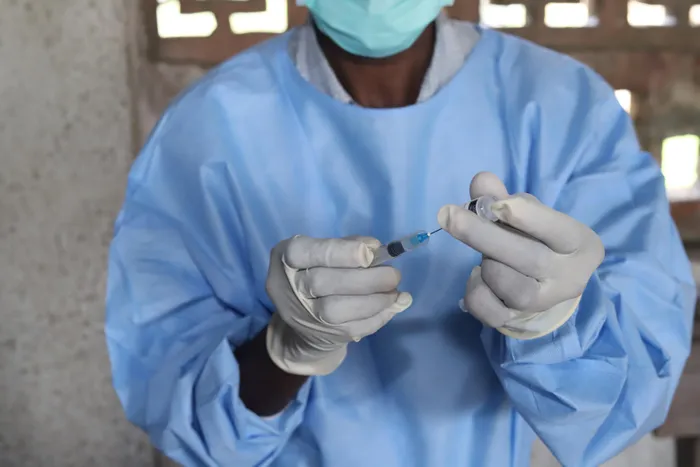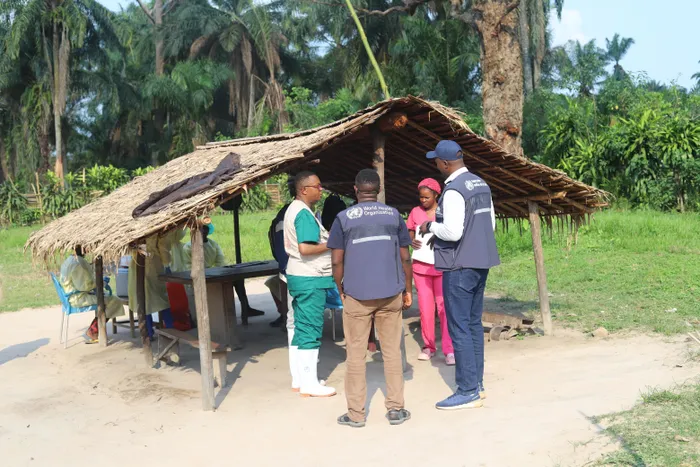WHO reports progress in controlling Ebola outbreak in the DRC

A vaccination campaign is underway in Bulape, DRC, aiming to protect at-risk populations from Ebola.
Image: WHO/ Joel Lumbala
The World Health Organisation (WHO) African Region has reported that response efforts are slowing the Ebola outbreak in the Democratic Republic of the Congo (DRC).
While reported cases over the last three weeks indicate the beginning of a downward trend, control measures are still essential to stop the outbreak and must be maintained and escalated.
Seven cases, including six confirmed and one probable, were reported from Bulape Health Zone in Kasai Province, a decline compared with the previous week when 11 confirmed cases were reported in the week ending on September 28.
Additionally, no new cases have been reported since September 30. A cumulative total of 64 cases (53 confirmed, 11 probable), including 42 deaths, had been reported as of October 1. The outbreak remains localised in Bulape.
The WHO African Region said over the last three weeks, significant strides have been made in all aspects of the Ebola response. By October 1, 97% of over a thousand listed contacts were being monitored. The disease surveillance system has been strengthened, evidenced by an increase in promptly investigated alerts. Clinical care has also been enhanced, with the treatment centre in the outbreak’s epicentre, Bulape health zone, expanding to 44 beds. Furthermore, infection prevention and control measures, along with community engagement, have been bolstered.
Additionally, a new vaccination strategy has been launched in Bulape, aiming to administer 18,000 doses across 19 localities. This initiative seeks to protect at-risk populations and curb the virus’s spread. To date, over 8,000 frontline health workers, along with confirmed cases and their contacts, have already received vaccinations.
“The early signs of progress are encouraging and underscore the need to sustain and intensify the life-saving measures,” said WHO Regional Director for Africa, Dr Mohamed Janabi.
“Every day without a case and every recovered patient moves us closer towards ending the outbreak.”
Janabi highlighted the collaborative efforts of WHO, the Africa Centres for Disease Control and Prevention, UNICEF, ALIMA, Médecins Sans Frontières, IFRC, Red Cross, and other partner organisations, all working in close coordination with the government to ensure prompt and effective outbreak control.
He said sustained efforts are essential to improving response operations in hotspots and maintaining progress.

Ebola cases are declining in the Democratic Republic of the Congo, according to the WHO, underscoring the need for continued control and community engagement to prevent further spread.
Image: WHO/ Joel Lumbala
Dr Patrick Abok, the acting regional emergency director for the WHO Regional Office for Africa, said the response still faces serious challenges despite the results.
He mentioned that they are now supporting eight neighbouring countries and the DRC to enhance their outbreak preparedness and response capabilities.
“Sustained efforts are essential to maintain progress in these hotspots. This also requires ensuring early detection of new cases and guaranteeing that every contact is traced, followed up, and vaccinated,” Abok said.
“We must continue investing in health systems, preparedness, but also community trust. This is very, very vital. Not only to end the current outbreak, but also to build resilience for the future.”
Abok added that there is no room for complacency during the outbreak. Response interventions must be sustained at a scale until the outbreak is contained in communities and ensure that communities are safe.
WHO Director-General Dr Tedros Adhanom Ghebreyesus said the area in which the outbreak is occurring is remote, which is helping to contain it, but also makes the response very difficult logistically.
For instance, the WHO built 2.5km of pipes to supply the area with water.
“We have also equipped the Ebola treatment centres with oxygen concentrators, which can be a life-saving treatment for the most sick,” Ghebreyesus said.
He said that before the outbreak, area health centres had no access to concentrated oxygen.
Ghebreyesus said last week the WHO published its Strategic Preparedness and Response Plan, with an appeal for US$66.6 million to support the WHO and its coalition of partners in implementing the plan.
thobeka.ngema@inl.co.za